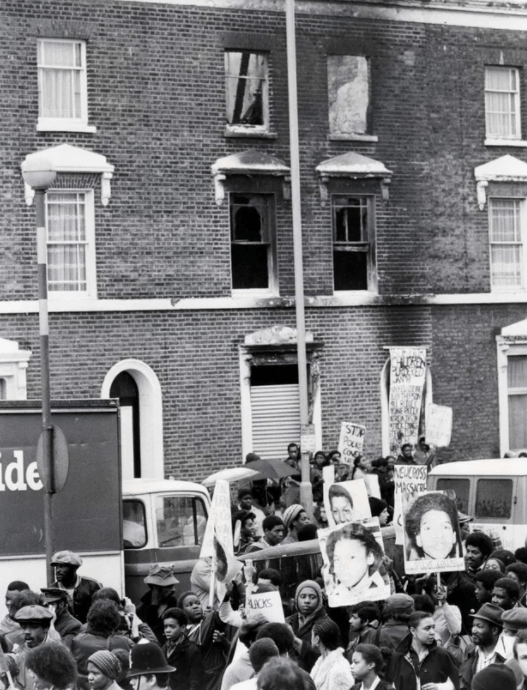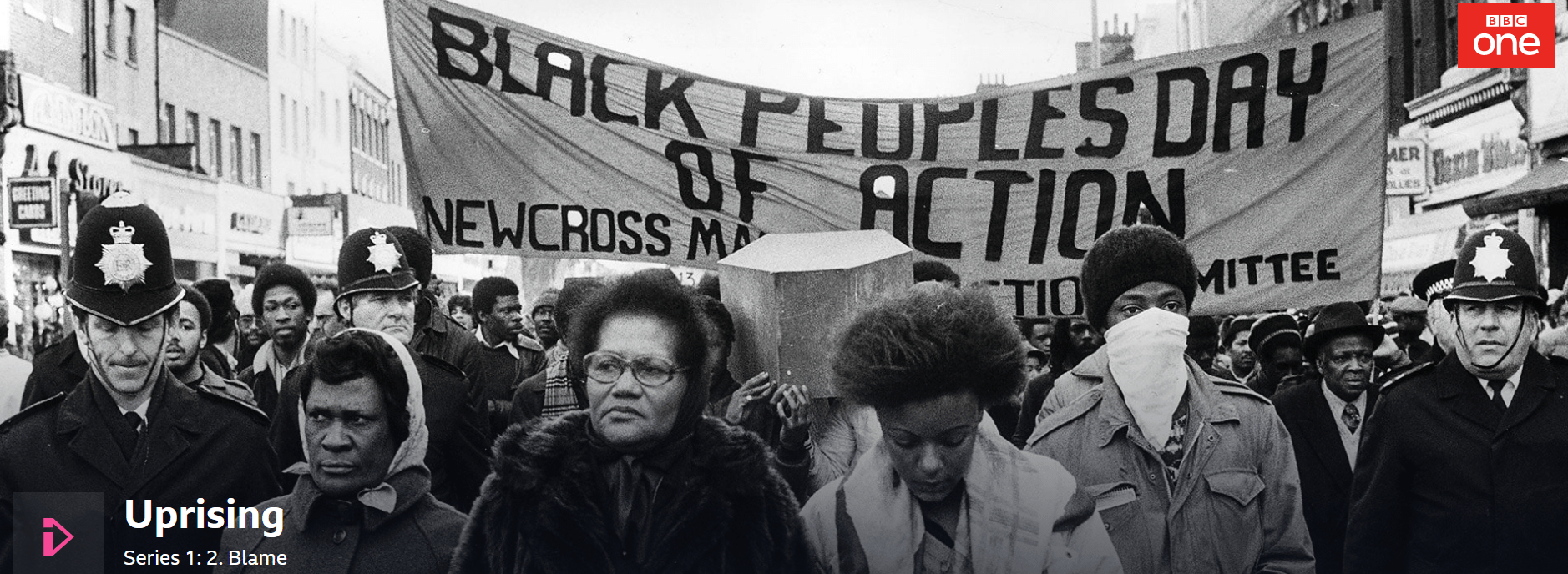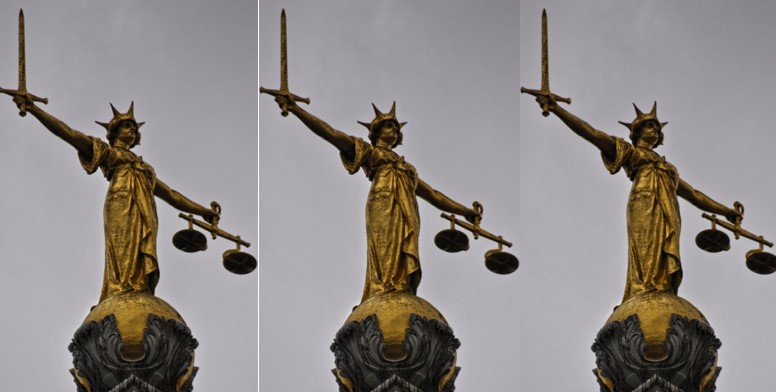TV Review by Mark Langabeer, Hastings and Rye Labour Member
An excellent three-part BBC programme series marks 40 years since the New Cross fire in South London and the struggles of Black and Asian youth in the 1970s against fascism and racism. The programme has interviews with survivors and families and those who investigated the fire and also catalogue some of the history of the struggles against racism in Britain.
The programme began with a march organised by the fascists in August 1977, aimed at intimidating black youth in the New Cross and Lewisham area in South East London. As one contributor said, blacks were increasingly being used as the scapegoats by the Tory right and fascist groups for the many social ills in Britain at that time. Unemployment had reached a post-war record level of one and a half million, living standards were stagnating and cuts in services were all giving the National Front, the main fascist party of the time, a boost in elections.
They were predictably assisted by reports in the gutter press about ‘young blacks mugging elderly white women’ and, as still happens today, these sensational and mostly made-up stories began to attract some of the most politically backword elements in society. At the time, there was some debate about how the labour movement should respond to the rise of the NF. The Labour leadership and the right opposed confronting the fascists on the streets, on the grounds that ignoring them would starve them of publicity so they would ‘go away’.
Fascists outnumbered ten to one by police protection
On the other hand, many activists felt that limiting opposition to the NF to words alone was not sufficient. As one contributor to the programme pointed out, the slogan adopted by the local youth in South London, as it had been in the pre-war fight against the Blackshirts, was,’ they shall not pass’. There were only around 500 fascists, but the police deployed nearly ten times that number to protect them, including some with horses. In the subsequent battles between police and local youth in central Lewisham, there was the first-ever use of riot shields in mainland Britain.
Despite the massive police presence, however, the fascists were given a bloody nose in the ‘Battle of Lewisham’ – many of them literally – by the mass mobilisation of thousands of youth, including contingents of the Labour Party Young Socialists. It was following those street battles that some fascists resorted to acts of terrorism.
There were arson attacks on the Moonshot Youth Club and the Albany Theatre, places frequented by black people in the area and situated near the starting point of the NF Demo. A contributor to the programme noted that that some radical book shops were also attacked.
Thirteen killed in New Cross house fire
These battles between local youth and the NF became a regular feature of British inner cities in the late 1970s, including parts of London. Later, in 1981, a fire broke out at a house in New Cross, once again near the site of the NF march three and a half years earlier. There were around a hundred, mainly black youth, at a birthday party when the fire started.
The fire killed thirteen young people, all between the ages of 14 and 22 and many more received life-changing injuries. One survivor took his own life some years later. The reaction of the police and those in authority appalled the local black community and only confirmed their deep suspicions against the police. It was noted that neither the Queen nor the Prime Minister of the day, Thatcher, sent condolences to the bereaved families.
The BBC programme noted that the fire was given relatively little media attention, and when there was reporting, it suggested that those responsible for the fire were among the guests. Initially, it was thought that an incendiary bomb had been thrown into the house, as some of the survivors heard a loud bang. However, forensic investigators were unable to find evidence of this and the police began to pursue a line enquiry that involved a fight at the party.
Police riddled with racist attitudes
Many of the survivors rejected this claim and two coroner’s reports declared an open verdict. One contributor to the programme, a white man who had attended the party, and a friend of one of those killed, described the police’s conduct throughout the investigation as riddled with racist attitudes. For many of the families and survivors of the fire there has been no closure because no one has ever been arrested.
One of the points emphasised in the TV programme was the level of racism existing within the police force at that time. One black officer recollected the racism that he experienced personally: such as monkey noises and other kinds of racial slurs. He confirmed that there were supporters of the NF among police ranks. There was even old footage of a representative of the Police Federation, arguing that the use of the ‘N ‘ word should not warrant disciplinary action against an officer.

The use of the sus laws and the breaking up of large parties by the police were another source of antagonism between the police and the black community. One commentator noted that he was stopped by police three times in a single day in one instance questioned because he was looking through the glass of a jeweller’s shop window!
The grievances held by many within the black community eventually led to the largest demonstration ever, organised mainly by black organisations. Over 20,000 attended the Blackfriars demo, which ended up in Fleet Street. Even this the police attempted to prevent, despite a prior agreement for the route that had been planned.
Brixton riots in 1981
The last episode of this very good series concentrates on the Brixton riots which took place later in 1981. Some of the contributors had taken part in the rioting and were unapologetic about their involvement. Some felt that the police ‘got some of their own medicine’. A couple of police officers confirmed that they were fearful during the riot and for a period, they had lost control. Although Thatcher attacked the rioters, the Home Secretary did set up a public enquiry led by Lord Scarman.
According to a participant, Scarman was willing to attend public meetings and listen to grievances that were raised, but after forty years the question that requires an answer is, has actually anything changed? In my opinion, change has been more in form, than substance and the Tories and the right-wing media still resort to racism when they see an advantage.
We know that Islamophobia is rife within the Tory Party and the Tories attitude to Black Lives Matter and sportspeople ‘taking the knee’ shows an underlying racist streak. Refusing to condemn those who boo footballers taking the knee is tantamount to enabling racists.
The BBC programme referred to Thatcher’s racist pitch in the 1979 general election, the first she won. However, it also occasionally backfires as it did for Tory candidate for London mayor, Zak Goldsmith. Programmes like these bring back memories of struggles against racism in the past, but the battle is far from won. Racism is part and parcel of the capitalist system and will only end when socialism replaces it.
The programme can be found on BBC i-player here.



